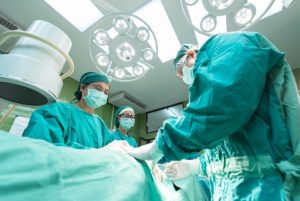 One in five high-risk patients undergoing major non-cardiac surgery will develop one or more heart complications within a year, according to research published today in European Heart Journal – Acute Cardiovascular Care, a journal of the European Society of Cardiology (ESC).
One in five high-risk patients undergoing major non-cardiac surgery will develop one or more heart complications within a year, according to research published today in European Heart Journal – Acute Cardiovascular Care, a journal of the European Society of Cardiology (ESC).
“Our study reveals a greater likelihood of having heart problems or dying after non-cardiac surgery than has been recognised to date,” said study author Christian Puelacher of the University of Basel, Basel, Switzerland. “Patients are also at risk for a longer period than was previously thought.”
The study was conducted in high-risk patients, which included people aged 65‒85, and those aged 45‒64 with cardiovascular disease, which included coronary artery disease, peripheral artery disease, or prior stroke. All patients had non-cardiac surgery which required them to stay in hospital at least one night afterwards. The types of procedures included visceral, orthopaedic, trauma, vascular, urologic, spinal, and thoracic surgery.
“People who undergo major surgery are increasingly old and have other diseases, and these are the patients we focused on in our study,” said Puelacher. “By providing information on postoperative complications, our research provides opportunities to make surgery even safer.”
The study included 2,265 patients, with an average age of 73 years and 43% of whom were women. Patients were followed for one year after surgery for heart attacks, heart failure, heart rhythm disorders, and death due to cardiovascular disease. To detect asymptomatic heart attacks, all patients had serial measurements of troponin while in hospital.
Approximately one in seven patients (15%) had at least one heart complication within 30 days. The 30-day incidence of heart complications was highest in patients who had thoracic surgery (22%), followed by vascular surgery (21%) and trauma surgery (19%). One in five patients (21%) had at least one heart complication within one year.
“This was one of the first studies to monitor patients for asymptomatic heart attacks after surgery,” said Puelacher. “These patients were at greater risk of subsequent events. One-third of patients who had an asymptomatic heart attack went on to have at least one more heart complication, compared to just 10% of those who did not have an asymptomatic heart attack. Our study suggests that measuring troponin levels before surgery and for two days afterwards could identify these patients and provide an opportunity to prevent further complications and death.”
Most complications occurred within the first 30 days after surgery, and in particular within the first week. But the investigators identified a vulnerable period of up to five months. Puelacher said: “Our results indicate that this high-risk patient group has an elevated likelihood of having an adverse cardiac event for three to five months after major surgery.”
Puelacher noted that the study did not investigate what patients can do to improve their outcomes. But he said: “Surgery is a process rather than a quick fix. Do not postpone your surgery, but if there is time and you want to prepare, quit smoking, be physically active and eat healthily so your body is in better shape.”









